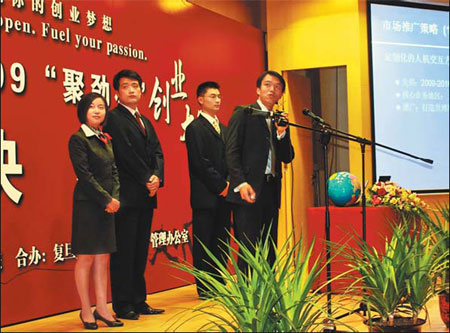|

IMBA students present their project in the Fudan University business plan competition. |
A question often posed to Fudan's IMBA students at their weekly lunch meeting asks which is more valuable - memorizing textbooks full of complex business cases and out-performing classmates on exams or pulling their nose out of books and getting out into the marketplace for real hands-on experience.
Program officers and consultants from the university's career development office point out that "learning to swim requires jumping in the water" and that practice-based projects bring MBA students the experience that recruiters look for when hiring top managers and executives.
The program also offers extracurricular activities, projects and courses in collaboration with other top business schools around the world that provide opportunities to apply knowledge and skills in an international environment, helping reshape the way students think and making them more competitive in their future careers.
Programs include the Fudan-Wharton Global Consulting Practicum (GCP), the MIT-Fudan China Lab program and the Fudan-Technion International Entrepreneurship Course that provide opportunities to learn in real-world business settings, make long-lasting connections and explore diverse work options.
Another learning opportunity is the Fudan MBA Business Plan Competition. For the 2009 program, participating teams, inspired by a series of lectures on entrepreneurship, discovered business opportunities, put them into real operation and managed their risks.
Competition judges, mostly venture capitalists or entrepreneurs, offered comments and tips and shared their own experience with the 109 teams. The three finalists successfully raised startup funds from venture capital companies and the College Student Foundation.
For some, results of the competition went far beyond an academic exercise. MBA student Edward Feng and founder of a human-computer interaction company, claimed first prize and received nearly 250,000 yuan for his new company.
Networking with the judges also brought his company more business opportunities, causing a chain reaction. At least 10 teams have set up companies in the Fudan University Science and Technology Park thanks to inspiration from the competition.
In remarks to the students, Dean Lu Xiongwen said: "Use your intellectual capital and what you've learned here, start from scratch so we can see more and more entrepreneurs grow up from within our students and alumni."
Another form of experiential learning is a business consulting project that gives Fudan MBA students the opportunity to develop and integrate business skills.
In the spring of 2009, more than 65 Fudan IMBA students in 15 teams provided consulting to domestic and international companies in the Yangtze River Delta region. Among them were two Fudan-Wharton GCP teams comprised of four to six Wharton MBA students and an equal number of Fudan MBA students that together provided consultancy services for senior managers of Chinese companies who want to enter or improve their performance in the North American market.
Through in-depth market analysis, students offered comprehensive recommendations and operational plans and helped companies better cope with management problems and capitalize on market opportunities.
After participating in the five-month-long project, Armstrong Li of the 2011 IMBA class said he was impressed.
"It's an excellent opportunity for not only picking up a wide variety of business issues, but also to share experiences. Input from real senior management definitely deepens our understanding of strategy, operations and management."
Feedback from client companies was equally positive.
"We have acquired comprehensive understanding and know-how about the US market through the professional consultation provided by the GCP team and also insightful business strategy for China," noted a client company on follow-up questionnaire.
Fudan administrators note that "top companies are calling upon students who can think out of the box instead of strictly offering textbook solutions - experiential learning is an education experience in which students apply concepts, methods, and paradigms they have learned in the classroom".
"The Fudan IMBA Program, with 'Learning by Doing' as its cornerstone, allows students to maximize their exposure to real business settings, positioning them ahead of the competition."
(China Daily 09/11/2009 page6)


